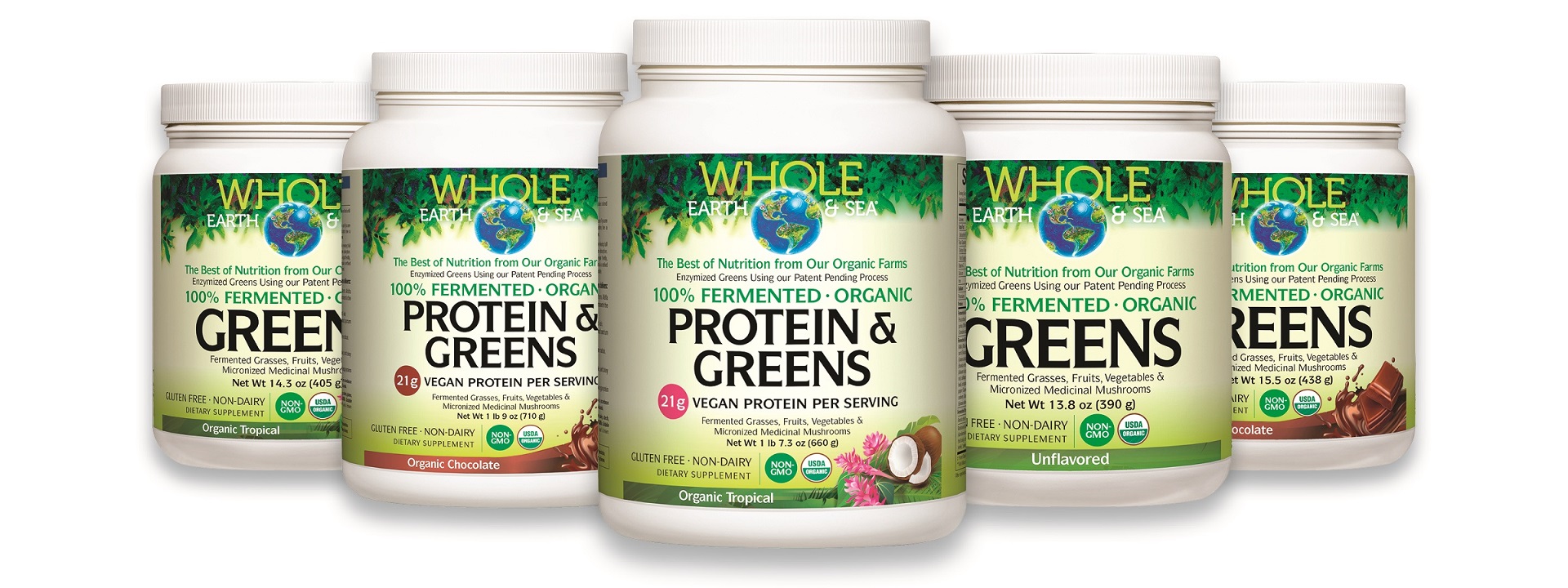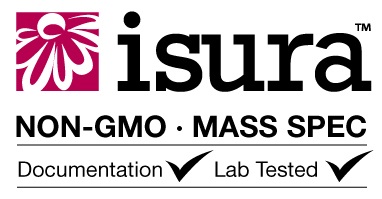More recently, studies have begun to identify the many nutritional benefits of fermentation: • Predigests plant materials for easily absorbed nutrients (2). • Helps preserve the beneficial nutrients in plants and amplifies their specific nutrient and phytochemical content (3, 4). • Enhances protein quality and the bioavailability of some nutrients, such as folic acid and pyridoxine (vitamin B6), and even supports the synthesis of nutrients such as vitamin B12 (5, 6). • Creates unique antioxidant flavonoids, enriching bioactive peptides, and lactoferrin (4). • Helps reduce levels of antinutrients, such as phytates, significantly improving the absorption of key minerals including zinc, iron, and calcium (7).
 From Farm To FermentationNatural Factors is pleased to introduce Whole Earth & Sea® 100% Fermented Organic Greens and Protein & Greens. These 100% fermented, 100% organic greens feature fermented grasses, fruits, vegetables, and micronized medicinal mushrooms and use a unique farm-to-fermentation process.
From Farm To FermentationNatural Factors is pleased to introduce Whole Earth & Sea® 100% Fermented Organic Greens and Protein & Greens. These 100% fermented, 100% organic greens feature fermented grasses, fruits, vegetables, and micronized medicinal mushrooms and use a unique farm-to-fermentation process.Factors FarmsOur products start at our certified organic Factors Farms where we’ve been growing

vegetables, grasses, and herbs for over a quarter century. “True species” seeds are nurtured and fertilized with compost and nitrogen-rich sea plants, as well as secluded from nearby agriculture to eliminate the possibility of GMO cross-contamination.
Our new Fermented Greens and Protein & Greens feature a whole food blend of grasses, vegetables, and herbs grown on our farms.
EnviroSimplex®After harvesting, we immediately process the plants at our facilities using our proprietary EnviroSimplex process. This cultures, protects, and concentrates the plants and their delicate phytonutrients.
FermentationUsing traditional methods of fermentation in a carefully controlled process, the whole foods are combined with organic molasses,L. plantarum, andS. boulardiiorS. cerevisiae. The mixtures are fermented for 24–72 hours, then stopped with flash heat.
Third-party Certified by ISURA
 ISURA uses advanced technology, including mass spectrometry, to guarantee the products are non-GMO compliant, contaminant free (tests for up to 500 potential contaminants), adulterant free, authenticated, and accurately and inclusively labeled.
ISURA uses advanced technology, including mass spectrometry, to guarantee the products are non-GMO compliant, contaminant free (tests for up to 500 potential contaminants), adulterant free, authenticated, and accurately and inclusively labeled.Why Choose Natural Factors Greens?• The ONLY 100% fermented and 100% organic fermented greens formula. • Includes 28 grasses, fruits, and vegetables — the majority are grown on Factors Farms. • Proprietary EnviroSimplex process delivers the highest concentration of phytonutrients. • Provides a powerful blend of immune-boosting mushrooms. • Each one-scoop serving is packed with eight servings of fruits and vegetables. • Provides all the essential acids, including the important BCAAs. • 21 g of the cleanest plant-based protein available in the Protein & Greens (6 g in the Greens). • Vegan, non-GMO, gluten free, dairy free; contain no artificial colors, sweeteners, or preservatives; and are naturally sweetened. • Bottles are made of 100% post-consumer recycled materials and are completely recyclable. • Exclusively available to the natural products industry. • Third-party certified by ISURA for GMOs, purity, and potency using advanced technology, including mass spectrometry.
References1. Benno Y, Suzuki K, et al. (1986). Comparison of the fecal microflora in rural Japanese and urban Canadians. Microbiol Immunol. 30, 521-532. 2. Chilton SN, Burton JP & Reid G. Inclusion of Fermented Foods in Food Guides around the World. Nutrients. 2015; 7(1):390-404. 3. Kim B, Minsu Hong V, Yang J, et al. A Review of fermented foods with beneficial effects on brain and cognitive function. Prev Nutr Food Sci. 2016; 21(4):297-309. 4. Selhub EM, Logan AC & Bested AC. Fermented foods, microbiota, and mental health: ancient practice meets nutritional psychiatry. Journal of Physiological Anthropology. 2017; 33(1):2. 5. Boye J, Wijesinha-Bettoni R. & Burlingame B. Protein quality evaluation twenty years after the introduction of the protein digestibility corrected amino acid score method. Br J Nutr. 2012; 108(Suppl 2):S183-S211. 6. D’Aimmo MR, Mattarelli P, Biavati B, et al. The potential of bifidobacteria as a source of natural folate. J Appl Microbiol. 2012; 112:975-984. 7. Humer E. & Schedle K. Fermentation of food and feed: A technology for efficient utilization of macro and trace elements in monogastrics. J Trace Elem Med Biol. 2016; 37:69-77.
Published in WholeFoods Magazine June 2018











